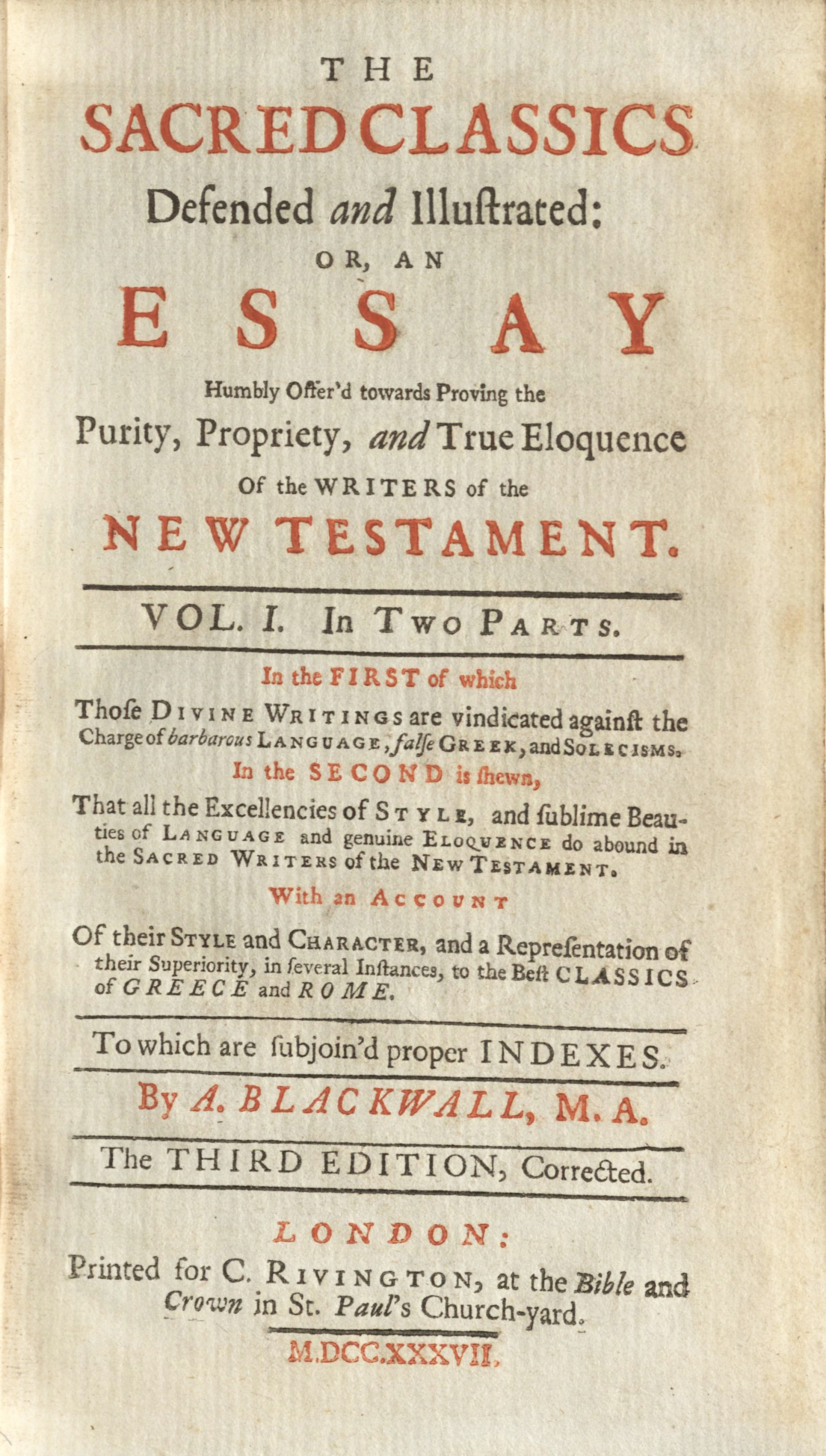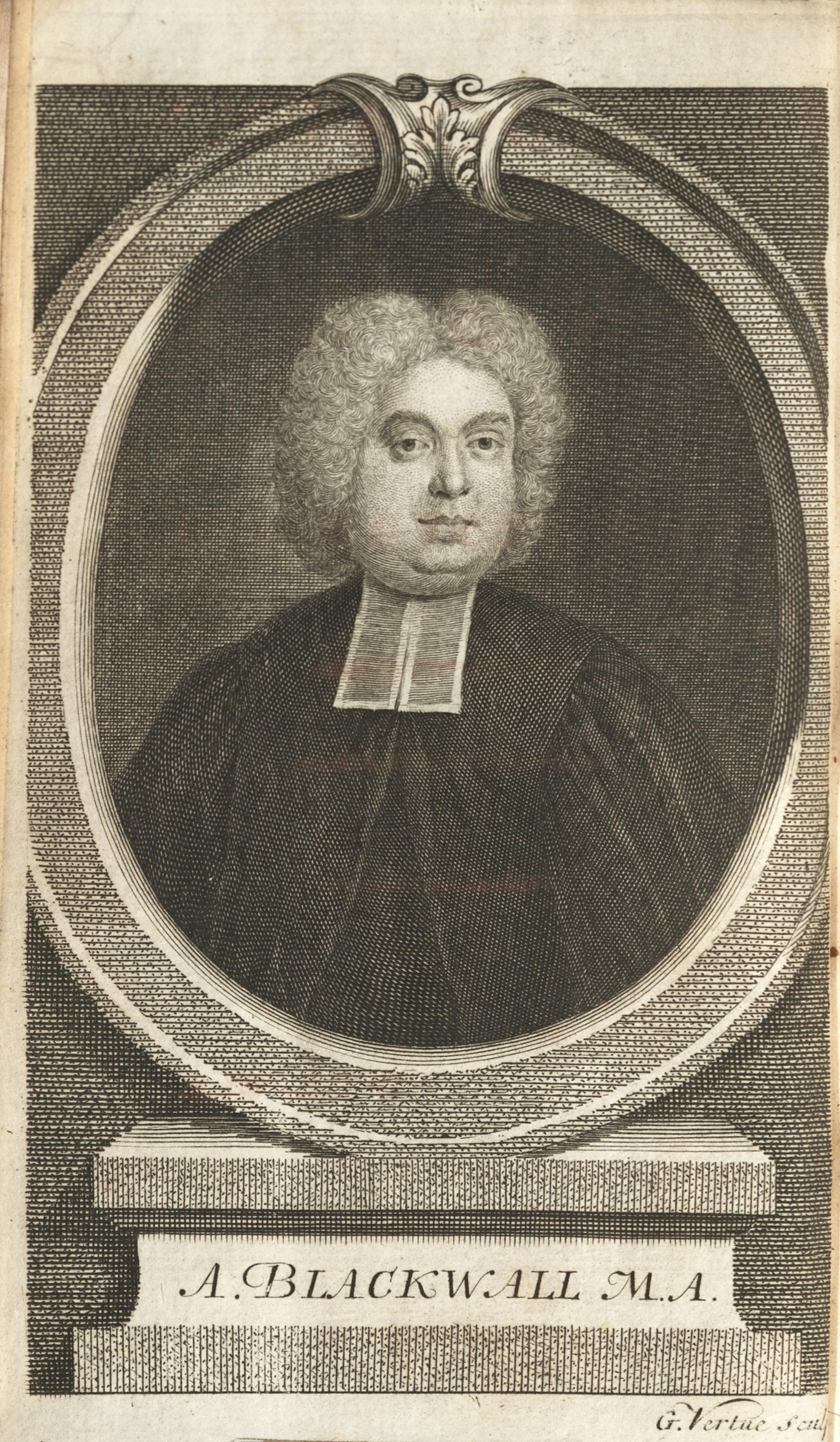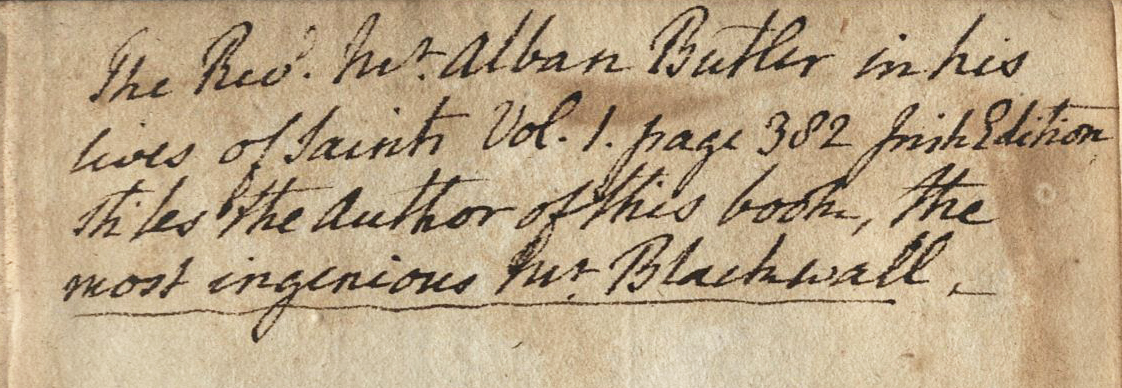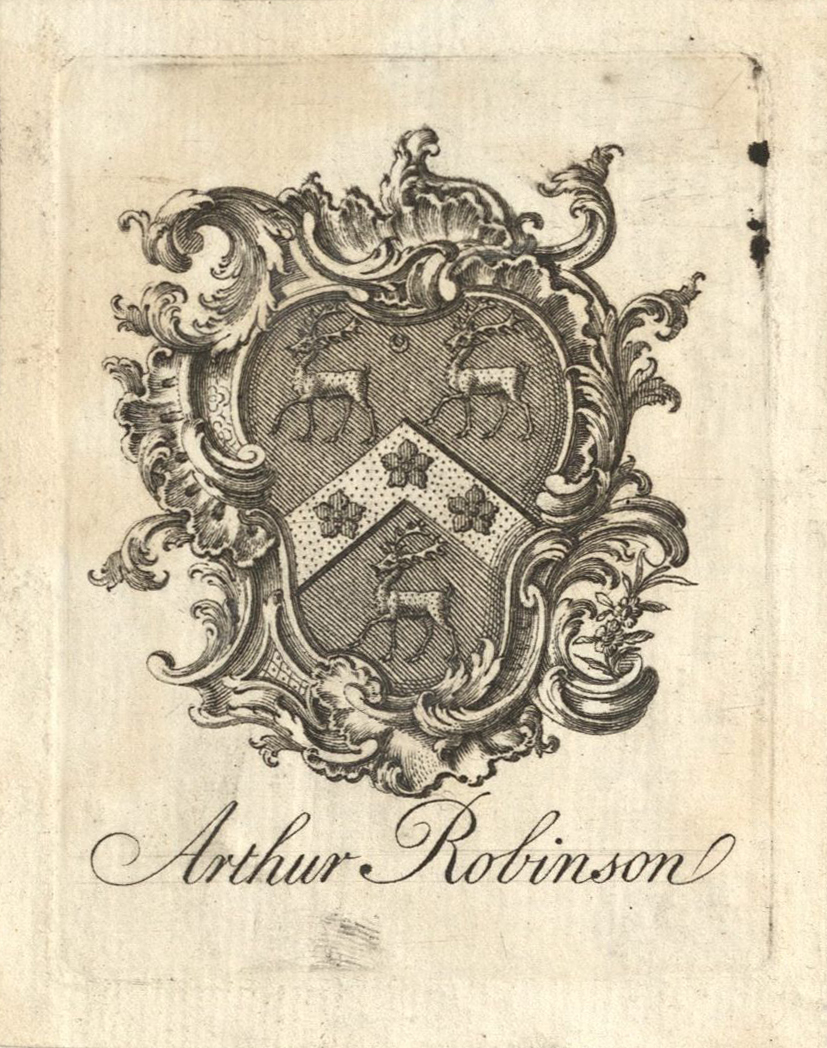Difference between revisions of "Sacred Classics Defended and Illustrated"
m (→References) |
m |
||
| Line 14: | Line 14: | ||
|pages=xii, 361 | |pages=xii, 361 | ||
|desc=[[:Category: Duodecimos|Duodecimo]] (18 cm.) | |desc=[[:Category: Duodecimos|Duodecimo]] (18 cm.) | ||
| − | |shelf=B- | + | |shelf=B-2 |
}}[[File:BlackwellSacredClassics1737v1Frontispiece.jpg|left|thumb|250px|<center>Frontispiece, volume one.</center>]]<br />[[wikipedia: Anthony_Blackwall|Anthony Blackwall]] (bap. 1672, d. 1730) grew up in Derbyshire, England, the son of Anthony Blackwall.<ref>John Westby-Gibson, rev. by S. J. Skedd, "[https://doi.org/10.1093/ref:odnb/2537 Blackwall, Anthony (bap. 1672, d. 1730)"] in ''Oxford Dictionary of National Biography'' (Oxford University Press, 2004- ), accessed March 2, 2022.</ref> After a grammar school education in Derby, he attended Emmanuel College, Cambridge, earning a BA in 1695 and an MA in 1698. His career included positions a headmaster of Derby grammar school and headmaster of Market Bosworth grammar school. Additionally, he held the vicarage of Elvaston, Derbyshire from 1699 to 1723 and the rectory of Clapham from October 1726 until his death in 1730.<ref>Ibid.</ref> | }}[[File:BlackwellSacredClassics1737v1Frontispiece.jpg|left|thumb|250px|<center>Frontispiece, volume one.</center>]]<br />[[wikipedia: Anthony_Blackwall|Anthony Blackwall]] (bap. 1672, d. 1730) grew up in Derbyshire, England, the son of Anthony Blackwall.<ref>John Westby-Gibson, rev. by S. J. Skedd, "[https://doi.org/10.1093/ref:odnb/2537 Blackwall, Anthony (bap. 1672, d. 1730)"] in ''Oxford Dictionary of National Biography'' (Oxford University Press, 2004- ), accessed March 2, 2022.</ref> After a grammar school education in Derby, he attended Emmanuel College, Cambridge, earning a BA in 1695 and an MA in 1698. His career included positions a headmaster of Derby grammar school and headmaster of Market Bosworth grammar school. Additionally, he held the vicarage of Elvaston, Derbyshire from 1699 to 1723 and the rectory of Clapham from October 1726 until his death in 1730.<ref>Ibid.</ref> | ||
Revision as of 08:36, 23 May 2024
by Anthony Blackwall
| Sacred Classics Defended and Illustrated | |
|
Title page from Sacred Classics Defended and Illustrated, George Wythe Collection, Wolf Law Library, College of William & Mary. | |
| Author | Anthony Blackwall |
| Published | London: Printed for C. Rivington |
| Date | 1737 |
| Edition | Third |
| Language | English |
| Pages | xii, 361 |
| Desc. | Duodecimo (18 cm.) |
| Location | Shelf B-2 |
Anthony Blackwall (bap. 1672, d. 1730) grew up in Derbyshire, England, the son of Anthony Blackwall.[1] After a grammar school education in Derby, he attended Emmanuel College, Cambridge, earning a BA in 1695 and an MA in 1698. His career included positions a headmaster of Derby grammar school and headmaster of Market Bosworth grammar school. Additionally, he held the vicarage of Elvaston, Derbyshire from 1699 to 1723 and the rectory of Clapham from October 1726 until his death in 1730.[2]
In 1706, Blackwall published his first work, a version of the poetry of Theognis of Megara entitled simply Theognis. He followed this with An Introduction to the Classics in 1718. After using it in both of his positions as headmaster, Blackwall anonymously published A New Latin Grammar: Being a Short, Clear, and Easy Introduction of Young Scholars to the Knowledge of the Latin Tongue in 1728.[3]
The Sacred Classics Defended and Illustrated first appeared in 1725. Of the latter, Blackwall wrote, "I have read the best and most authentic Greek writers, with a view of comparing them with the divine writers of the New Testament; by which I have been enabled to prove the purity and elegance of numerous passages, which for several ages have by eminent scholars been condemned as solecisms.[4] The work received mixed reviews. Both Philip Doddridge and Thomas Hartwell Horne commended it. Other contemporaries of Blackwall such as Samuel Clarke and John Gilbert Cooper were unimpressed.[5]
Evidence for Inclusion in Wythe's Library
Listed in the Jefferson Inventory of Wythe's Library as "Blackwell's sacred classics. 2.v. 12mo." This was one of the books kept by Thomas Jefferson. He later sold a copy of the 3rd edition (1737) to the Library of Congress in 1815, but only volume 2 survives.[6] No markings verify Wythe's prior ownership. Both the Brown Bibliography[7] and George Wythe's Library[8] on LibraryThing include the 3rd edition based on the volume at the Library of Congress. The Wolf Law Library purchased a copy of the same edition.
Description of the Wolf Law Library's copy
Bound in contemporary full panelled calf. Spine features raised bands, blind compartments, gilt volume numbers and gilt-lettered red morocco labels. Includes the bookplate of Arthur Robinson on each front pastedown. Purchased with the George Wythe Boswell-Caracci Room Acquisition Fund.
Images of the library's copy of this book are available on Flickr. View the record for this book in William & Mary's online catalog.
See also
References
- ↑ John Westby-Gibson, rev. by S. J. Skedd, "Blackwall, Anthony (bap. 1672, d. 1730)" in Oxford Dictionary of National Biography (Oxford University Press, 2004- ), accessed March 2, 2022.
- ↑ Ibid.
- ↑ Ibid.
- ↑ Blackwall, Anthony. The Sacred Classics Defended and Illustrated, or, An Essay Humbly Offer'd Towards Proving the Purity, Propriety, and True Eloquence of the Writers of the New Testament. 2nd ed. (London: Printed for C. Rivington ... , 1727): Preface.
- ↑ John Westby-Gibson, rev. by S. J. Skedd, "Blackwall, Anthony (bap. 1672, d. 1730)."
- ↑ E. Millicent Sowerby, Catalogue of the Library of Thomas Jefferson (Washington, D.C.: The Library of Congress, 1952-1959), 4:528 [no.4715].
- ↑ Bennie Brown, "The Library of George Wythe of Williamsburg and Richmond," (unpublished manuscript, May, 2012) Microsoft Word file. Earlier edition available at: https://digitalarchive.wm.edu/handle/10288/13433
- ↑ LibraryThing, s. v. "Member: George Wythe", accessed May 11, 2023.



